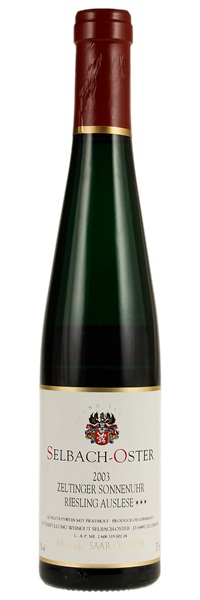Light capsule condition issue; light label condition issue
Removed from a subterranean, temperature and humidity controlled residential cellar; Purchased at retail

Image above is an example. To view the image of the lot, click the item number.
Estimate
Loads of finesse and apricot, honey and lime notes mark this elegant auslese. Very concentrated, yet light on its feet, with a long finish. Needs time to come together. Drink now through 2020. –BS
...immensely rich and thick, it has wonderful balance, freshness, and harmony...pineapple, passion fruit, poached pear, and raspberry flavors. Deep, concentrated and pure, it also exhibits an exceptionally long finish...